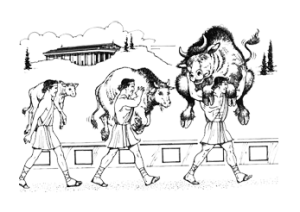Why Progressive Resistance Isn’t Always Progressive
by Thom Van Vleck

Milo of Croton is often credited with originating the concept of Progressive Resistance.....at least in folk lore.
Most everyone knows the story of Milo. He was a Greek wrestler that dominated wrestling in ancient Greece in his time…that is pretty much a fact. The legend is he became that way because he observed that he could lift a bull on his shoulder and he supposed that if he did that every day that he should still be able to do that when the bull was full grown. He then did that, and carried the bull on his shoulders into the Olympic Stadium, slew it and ate meat from it raw to intimidate his fellow wrestlers. That part may be fact, partly true, or just a great story. I know it would play well in modern professional wrestling!
The idea was that if you put the body under increasing progressive resistance it would adapt slowly but surely and become stronger. I think most of us understand that if you weight train, that’s the idea! What I don’t think most realize is that the adaptation to work load is a flat, linear line from weak to strong. It actually probably looks like a zig zag line to slow climbs over time where you see ups and downs that if averaged made a nice linear line.
Most people handle making gains pretty well. Who doesn’t! What really separates those who make great gains is those who handle the down times. My point is that when you have times that you slide it’s how you react to that lack of progress or even loss of progress that dictates long term success. It’s the reason they set up great boxers with “bums” they can beat up on. Sure, lots of wins and knockouts will sell lots of tickets but that’s not why they really do that. It’s to create confidence in the fighter. Getting you butt kicked does not instill confidence in most people.
Those most successful are those that learn to deal with failure and find the ways to most quickly turn it around. They have short memories on failure and stay focused on success. They know that failure is part of the process and keep their head down and keep working. They understand that progress isn’t always linear, accept it, and make each failure a part of their learning process. They also understand that a lack of progress means a time for change and they don’t stubbornly hold onto a set routine just for the sake of finishing that routine. They make adjustments and keep focused on what’s going to help them reach their goal
So, my point is, progressive resistance my not always be as progressive. Success comes from dealing with that quickly, efficiently, and getting back on track. So the next time you hit a sticking point…know that’s when champions are made…not when it’s going well. Because even great boxing champs get knocked out once and you never see them at the top again. But the greatest come back time and again!